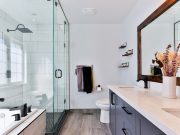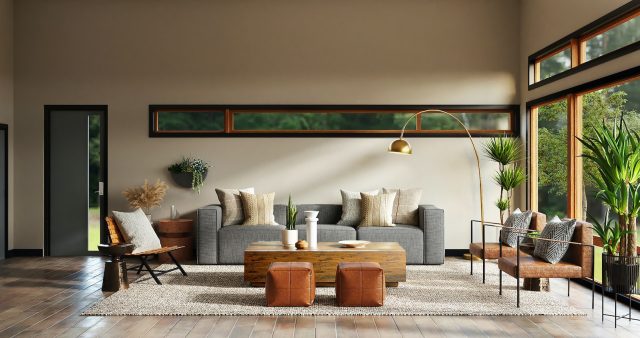Creating a beautiful and functional home is an exciting yet daunting task. Decorating your space can be overwhelming with so many choices available in today’s market. However, with the right strategy and guidance, you can create a home that looks great, feels comfortable, and is highly efficient. This article will provide useful tips on how to do just that, from identifying design elements to creating a practical plan of action for decorating your home.
Home Decor
Home decor is a way of expressing your personality and creating a space that reflects your unique style. Many elements go into home decor, including color, texture, pattern, furniture, and accessories. When selecting these elements, it’s important to consider how they work together to create a cohesive and inviting space.
One of the most important aspects of home decor is color. Choosing the right colors can set the tone for a room and create a certain mood or ambiance. Warm colors like reds and oranges can create a cozy and inviting feel, while cool colors like blues and greens can create a calm and relaxing atmosphere.
Texture and pattern are also important in home decor, as they add depth and interest to a space. Mixing different textures, such as rough and smooth, can create contrast and add visual appeal. Incorporating patterns like stripes or florals can add a playful or sophisticated touch to a room.
Furniture is another essential element in home decor. Choosing stylish and functional pieces is important, especially in smaller spaces. Multi-functional pieces, such as a storage ottoman or a pull-out sofa bed, can help maximize space and make the most of your furniture.
Finally, accessories are the finishing touches that tie a room together. Adding art, plants, or decorative objects can add character and personality to a space. The key is to select pieces that complement your overall design and add interest without overwhelming the space.
In conclusion, home decor is a way to create a comfortable and inviting space that reflects your style. You can transform any room into a beautiful and functional living space by carefully selecting color, texture, furniture, and accessories.
Floor Planning

Floor planning is a crucial aspect of interior design and can significantly impact the functionality and flow of a space. Whether you are moving into a new home or renovating an existing one, proper floor planning is essential to create a space that meets your needs and reflects your personal style.
To start, measure the dimensions of your room and create a rough sketch of the floor plan. This will help you visualize how much space you have to work with and determine the best layout for your furniture. Next, consider the purpose of the room and how it will be used. For example, a living room may be used for lounging, entertaining, or watching TV, so it should have a comfortable seating arrangement and a clear view of the television.
When creating a floor plan, it’s important to consider the flow of traffic and the location of doors and windows. Arrange furniture in a way that allows for easy movement throughout the room and avoids blocking natural light. Additionally, think about the scale and proportion of your furniture in relation to the room size. Oversized furniture can make a small room feel cramped, while small furniture can make a large room feel empty.
Once you have a general floor plan, experiment with different layouts to find the one that works best for you. Consider creating a focal point, such as a fireplace or a piece of artwork, and arrange furniture around it. Play with different angles and configurations until you find the perfect balance of form and function.
In conclusion, floor planning is a crucial aspect of interior design and can greatly impact the functionality and flow of a space. By considering the purpose of the room, the flow of traffic, and the location of doors and windows, you can create a floor plan that meets your needs and reflects your personal style.
Creating a Theme
Creating a theme for your home is a great way to give it a cohesive and well-designed look. A theme can be based on a specific color scheme, style, or even a particular hobby or interest. Whatever your inspiration may be, creating a theme can help you make decisions about everything from furniture to decor.
To begin creating a theme, start by brainstorming ideas and collecting inspiration. Look to sources like magazines, websites, and social media platforms like Pinterest for ideas. Once you have a general idea of the look and feel you want to achieve, it’s time to start deciding about specific elements like color, furniture, and decor.
Consider using a color wheel to choose complementary or contrasting colors when selecting a color scheme. You can also use neutral colors as a base and add pops of color through decor or accent pieces.
When selecting furniture, consider the style and materials. If you’re going for a beachy theme, you might want to incorporate natural textures like rattan or wicker. If you’re going for a more modern look, you might opt for sleek, simple pieces with clean lines.
Finally, when selecting decor, look for items that fit your theme. For example, if creating a rustic farmhouse theme, you might add galvanized metal accents, vintage signage, and distressed wood furniture.
Remember, creating a theme for your home is all about cohesion and personal expression. Don’t be afraid to experiment and make your own rules. With a little creativity and planning, you can create a unique space.
Utilizing Wall Space
Utilizing wall space is essential to home decor and can help maximize your living space. Walls are blank canvases that can be transformed into functional and beautiful areas to display art, add storage, or create visual interest. Here are some ideas for utilizing wall space in your home:
- Create a gallery wall: A gallery wall is a fantastic way to showcase artwork or family photos. Choose a focal point, such as a large piece of art, and build around it with smaller pieces that complement it. Mix and match different frame styles and sizes to create a dynamic and visually interesting display.
- Add shelves: Shelves are an excellent way to add storage and display space to your walls. They can be used to store books, plants, or decorative objects. Floating shelves are popular for modern homes, creating a clean and minimalist look.
- Hang mirrors: Mirrors are a versatile decorative element that can add depth and light to a room. They can also make a space feel larger and more open. Hang a large mirror in a small space to create the illusion of more room, or group smaller mirrors together to create a statement piece.
- Install a statement piece: Make a bold statement by installing a large piece of art, a mural, or a wallpaper accent wall. This can add texture, color, and visual interest to a space and create a focal point for the room.
- Use functional wall decor: Wall-mounted organizers, such as a mail sorter or a key holder, can help keep your home clutter-free and organized. These items can be both practical and decorative, adding to the overall aesthetic of your home.
In conclusion, utilizing wall space is an essential aspect of home decor. By incorporating these ideas, you can transform your walls into functional and beautiful areas that add depth and interest to your home.
Lighting and Color
Lighting and color are two of the most important elements in home decor, and they can greatly impact a space’s overall look and feel. Here are some tips on how to utilize lighting and color in your home:
Lighting:
- Use multiple light sources: Incorporate different types of lighting, such as overhead lighting, floor lamps, and table lamps, to create a warm and inviting atmosphere.
- Consider the color temperature: Choose light bulbs with warm or cool color temperatures to create different moods. Warm bulbs create a cozy and intimate ambiance, while cool bulbs provide a bright and energizing feel.
- Use dimmer switches: Dimmer switches allow you to adjust the intensity of the lighting to suit your needs and create a more versatile environment.
Color:
- Create a color scheme: Choose a color scheme that reflects your personal style and the mood you want to create. A monochromatic scheme uses different shades of the same color, while a complementary scheme uses colors that are opposite each other on the color wheel.
- Use accent colors: Add pops of color to a neutral room with accent pieces such as throw pillows, artwork, or curtains.
- Experiment with color placement: Use color strategically to create a focal point or draw attention to a particular room area. For example, paint an accent wall or use a bold rug to anchor a seating area.
- Consider the mood: Different colors can evoke different emotions. Cool colors like blue and green create a calming atmosphere, while warm colors like red and orange can create a more energetic and lively space.
In conclusion, lighting and color are essential elements in home decor that can greatly impact a space’s overall look and feel. By incorporating different types of lighting, using a thoughtful color scheme, and considering the mood you want to create, you can create a functional and visually appealing space.
Accessorizing with Furniture
Accessorizing with furniture is an important aspect of home decor, and it can help add personality, character, and style to a room. Here are some tips on how to accessorize with furniture:
- Use unique pieces: Incorporate unique or one-of-a-kind pieces of furniture to add character to a room. An antique chair or a vintage side table can add a touch of personality and charm to an otherwise neutral space.
- Mix and match styles: Don’t be afraid to mix and match furniture styles to create a unique and eclectic look. For example, pair a modern sofa with a vintage rug or a traditional side table.
- Play with texture: Use furniture to add texture and depth to a room. A plush rug or a woven throw can add warmth and coziness, while a sleek metal table adds modern elegance.
- Add storage: Furniture can also add storage and organization to a space. Choose pieces with built-in shelves or drawers to keep clutter at bay and create a streamlined look.
- Create a focal point: Use furniture to create a focal point in a room. A statement piece like a bold sofa or a unique coffee table can draw the eye and anchor the space.
- Use scale and proportion: Consider the scale and proportion of your furniture in relation to the room size. Oversized furniture can make a small room feel cramped, while small furniture can make a large room feel empty. Choose furniture that fits the scale and proportion of your space.
In conclusion, accessorizing with furniture is an important aspect of home decor that can add personality, style, and functionality to a room. By incorporating unique pieces, mixing and matching styles, playing with texture, adding storage, creating a focal point, and using scale and proportion, you can create a functional and visually appealing space.
Conclusion: Beautiful Home
In conclusion, creating a beautiful home is all about utilizing various decor elements thoughtfully and intentionally to achieve a cohesive and visually pleasing space. By considering the theme, utilizing wall space, floor planning, lighting and color, and accessorizing with furniture, you can create a beautiful and functional home. Remember that a beautiful home is not just about following the latest trends, but it should also reflect your style and needs. With a little creativity, attention to detail, and a willingness to experiment, you can create a home that truly reflects your unique personality and style.






























